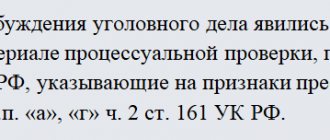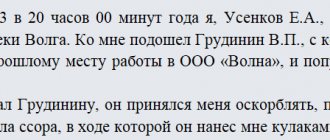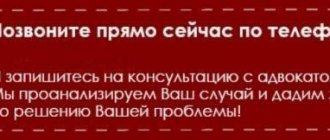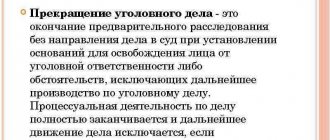1. If there is no basis for initiating a criminal case, the head of the investigative body, the investigator, the inquiry body or the inquirer shall issue a resolution to refuse to initiate a criminal case. Refusal to initiate a criminal case on the grounds provided for in paragraph 2 of part one of Article 24 of this Code is permitted only in relation to a specific person.
1.1. A decision to refuse to initiate a criminal case in connection with a reasoned decision of the prosecutor to send the relevant materials to the preliminary investigation body to resolve the issue of criminal prosecution based on violations of criminal law identified by the prosecutor, made on the basis of paragraph 2 of part two of Article 37 of this Code, may be made only with the consent of the head of the investigative body.
2. When making a decision to refuse to initiate a criminal case based on the results of checking a report of a crime related to the suspicion of its commission by a specific person or persons, the head of the investigative body, the investigator, the inquiry body are obliged to consider the issue of initiating a criminal case for knowingly false denunciation against a person who has declared or disseminated a false report of a crime.
3. Information about the refusal to initiate a criminal case based on the results of checking a report of a crime disseminated by the media is subject to mandatory publication.
4. A copy of the decision to refuse to initiate a criminal case is sent to the applicant and the prosecutor within 24 hours from the date of its issuance. At the same time, the applicant is explained his right to appeal this decision and the procedure for appealing.
5. The refusal to initiate a criminal case may be appealed to the prosecutor, the head of the investigative body or to the court in the manner established by Articles 124 and 125 of this Code.
6. Having recognized the decision of the body of inquiry, the interrogator on the refusal to initiate a criminal case as illegal or unfounded, the prosecutor cancels it and sends the corresponding resolution to the head of the body of inquiry with his instructions, setting a deadline for their execution. Having recognized the refusal of the head of the investigative body, the investigator to initiate a criminal case as illegal or unfounded, the prosecutor, no later than 5 days from the receipt of the materials for verifying the crime report, cancels the decision to refuse to initiate a criminal case, about which he issues a reasoned resolution outlining the specific circumstances subject to additional verification, which, together with the specified materials, is immediately sent to the head of the investigative body. Having recognized the refusal of the head of the investigative body, the investigator to initiate a criminal case as illegal or unfounded, the corresponding head of the investigative body cancels it and initiates a criminal case or sends materials for additional verification with his instructions, setting a deadline for their execution. 7. Having recognized the refusal to initiate a criminal case as illegal or unfounded, the judge makes a corresponding decision, sends it for execution to the head of the investigative body or the head of the inquiry body and notifies the applicant about this.
To whom are copies of the resolution sent?
The results of the preliminary investigation are available for review to all interested participants (COP Post No. 13-P dated April 29, 1998). Therefore, a notice of refusal to initiate criminal proceedings is sent:
- To the victim, even if the application was not submitted by him (Article 42 of the Code of Criminal Procedure). He is also notified of the right of appeal and its methods.
- The person against whom the applicant's charges were brought.
- The perpetrator of the committed act (in this case, reclassified as an administrative violation), who may also be the object of the statement.
- To the prosecutor, if the investigation was carried out on his initiative.
- To the tax office or insurance company that sent materials to open proceedings on the basis of Art. 198–199.4 CC.
- To the media for publication if information about the crime under investigation has also been the subject of public attention.
Copies of the refusal decision must be sent within 24 hours from the date of its adoption.
False denunciation
If the preliminary investigation authorities find out that information about a committed or impending attack had the signs provided for in Art. 306 of the Criminal Code or another punishable act, they need to consider opening proceedings against the person who provided such information in the usual manner. The prosecutor must take similar actions if during the inspection he discovers signs of a false denunciation.
Where can I file a complaint about a refusal?
Investigative bodies do not have the right to cancel a refusal. An unlawful decision not to initiate a criminal case can be appealed:
- To the senior management of the investigative department. Having become convinced of the legitimacy of the complaint, the chief cancels the refusal decision and:
- personally opens production;
- initiates an additional check.
- The prosecutor, who is not authorized to initiate a case on his own, but has the right:
- cancel the refusal order;
- within 5 days, send the appropriate instructions to the leadership of the inquiry or investigative authorities.
- In a court. If the refusal is found unfounded, the court:
- makes a decision on its cancellation and the opening of office proceedings;
- sends instructions to the head of the inquiry authorities or investigative department.
How to appeal a refusal to initiate a criminal case is established in Art. 124 and 125.
Commentary on Article 148 of the Code of Criminal Procedure of the Russian Federation
1. The article under comment defines the procedural procedure for refusing to initiate a criminal case. This decision is made by the investigator or inquiry officer if the received reason and the inspection materials contain grounds for refusing to initiate a criminal case (Part 1 of Article 24 of the Code of Criminal Procedure of the Russian Federation).
2. The decision to refuse to initiate a criminal case must meet the requirements specified in Part 4 of Art. 7 of the Criminal Code of the Russian Federation, i.e. be legal, reasonable and motivated.
3. Refusal to initiate a criminal case due to the absence of corpus delicti in the act (clause 2, part 1, article 24 of the Code of Criminal Procedure of the Russian Federation) can only occur in cases where the issue of initiating a criminal case against a specific person has been resolved. This provision is due to the fact that if a person is not identified, the intent of that person cannot be determined, because it is possible that it was aimed specifically at committing a crime.
4. The decision of the investigator (inquiry officer) to refuse to initiate a criminal case, among other information, indicates the results of checking the report of a crime and the basis for refusing to initiate a criminal case from among those provided for in Part 1 of Art. 24 Code of Criminal Procedure of the Russian Federation.
5. The commented article establishes a complicated procedure for initiating criminal cases in cases where the investigator received a prosecutor’s order to send materials to the preliminary investigation body to resolve the issue of criminal prosecution (clause 4, part 1, article 140 of the Code of Criminal Procedure of the Russian Federation). In order for the investigator's decision to refuse to initiate a criminal case to acquire legal force, it is required that the investigator obtain the written consent of the head of the investigative body. This serves as an additional guarantee of the legality, validity and motivation of this procedural act.
6. Part 2 of the commented article states that if there is a refusal to initiate a criminal case, the investigator or the body of inquiry is obliged to consider the issue of initiating a criminal case against the person who declared or disseminated a knowingly false report about a crime. Responsibility for knowingly false denunciation of a crime is provided for in Art. 306 of the Criminal Code of the Russian Federation. Therefore, if a mistake is made in good faith, it cannot be brought to criminal liability under this article.
7. Part 3 of the commented article establishes a rule according to which information about the refusal to initiate a criminal case based on a message that was disseminated in the media must also be published. It seems that this should be done in the same media, and in the absence of such an opportunity, in a similar circulation volume and distribution region.
8. A copy of the decision to refuse to initiate a criminal case must be sent to the applicant and the prosecutor (Part 4 of the commented article). The applicant has the opportunity to appeal it in court (Part 1 of Article 125 of the Code of Criminal Procedure of the Russian Federation), and the prosecutor has the opportunity to cancel it if it is found illegal or unfounded (Part 6 of the commented article).
9. Part 6 of the commented article establishes the procedure for the actions of the prosecutor after receiving a copy of the decision to refuse to initiate a criminal case. It depends on who made the said decision. If the decision was made by the body of inquiry or the inquirer, then the prosecutor independently cancels it and sends the decision to the head of the body of inquiry for further implementation of the preliminary investigation.
10. If an illegal or unfounded decision to refuse to initiate a criminal case was made by an investigator, then the prosecutor issues a reasoned decision to cancel the decision to refuse to initiate a criminal case, after which he forwards the materials to the head of the investigative body. Then, based on the results of an additional inspection, the head of the investigative agency either initiates a criminal case or transfers the materials to the investigator for additional inspection.
11. If a complaint against the decision to refuse to initiate a criminal case was sent to the court, then the judge of the district court, in accordance with Part 7 of the commented article, based on the results of its consideration, makes one of the decisions: 1) to refuse to satisfy the complaint and leave the decision unchanged; 2) to satisfy the complaint and return the materials to the prosecutor or the head of the investigative body. In the second case, the prosecutor and the head of the investigative body make the decision provided for in Part 6 of the commented article.
12. In cases where the court comes to the conclusion that there is information indicating the signs of a crime in the act, it must, while refraining from statements about the sufficiency of grounds to suspect a specific person of committing this crime and from formulating charges, send relevant materials to verify the reasons and grounds for initiating a criminal case to the authorities carrying out criminal prosecution.
13. At the same time, the fact that the court, if the decision to refuse to initiate a criminal case is declared illegal, is not authorized to initiate a criminal case, cannot be regarded as releasing the investigator or interrogating officer from the obligation to eliminate the violations that were pointed out by the court. Failure of these officials to fulfill such duties may serve as grounds for further appeal of these actions (inaction), as well as for taking liability measures for failure to comply with a court decision.
Time limits for checking a complaint
The verification of materials relating to the cancellation of an unlawful refusal is carried out within the time frame specified by the recipient of the complaint - the head of the investigation authority, the prosecutor, the judge. The maximum duration of an inspection is not directly stipulated by law, but is limited by departmental regulations:
- Prosecutors mentioning the need to adhere to reasonable time limits.
- Investigative Committee, releasing for inspection until:
- 10 days according to Art. 144 Code of Criminal Procedure;
- 30 days at the request of the investigator, if the following is to be studied: documents;
- items;
- corpses;
- tax reporting;
- financial and economic activities.
How to file a complaint about the inaction of a criminal investigator or prosecutor - read in a separate article https://lexconsult.online/7631-obzhalovanie-nezakonnyh-deistvii-politsii-primery-situatsii-obraztsy-zhalob
Legal grounds for refusal
The circumstances that make it possible to refuse to initiate a criminal case or to terminate already opened proceedings are listed in Art. 24 Code of Criminal Procedure:
- No crime took place.
- The violation does not contain a crime.
- The statute of limitations for opening a case has expired.
- The death of the suspect (accused) occurred.
- The victim did not file a statement.
- There is no court opinion.
The presence of these reasons requires documentary confirmation.
An example of how grounds for refusal may be illegal is in the video below:
No illegal act
Information about the commission of a criminal act may be erroneous and caused by the applicant’s lack of awareness. For example, if a large sum of money disappears, family members may suspect theft, when in fact the owner of the funds lent it to a friend without notifying loved ones.
Also, the investigator’s refusal to initiate a criminal case may be explained by doubts regarding the guilt of the suspect, which are interpreted in his favor. This equates an unidentified event with a non-existent one.
Lack of crime
A violator cannot be held criminally liable if at least one of the elements included in a specific crime is missing (or not established). For example, the actions of the perpetrator:
note
A criminal case may be initiated for non-payment of alimony if facts of malicious evasion from paying contributions are recognized. These include: deliberate dismissal from work, concealment of real income, change of residence. You can find out more details in this article.
- Justified by the extreme circumstances mentioned in the Criminal Code, and were committed: for the purpose of self-defense;
- when detaining the culprit;
- under duress;
- for other reasons.
When issuing a refusal order, it is necessary to mention exactly what crime it is. Also, the fact of the absence of a crime must be established in relation to a certain person (Article 148 of the Code of Criminal Procedure), the identification of which is the responsibility of the employees of the investigative department. In some cases, this requirement is practically impossible to fulfill and makes little sense from a logical point of view. For example, when the insignificance of the act is clear even without identifying the perpetrator.
The absence of signs of a criminal act does not mean complete release of the perpetrator from punishment. He may be brought to administrative or civil liability.
For example, a driver hit a pedestrian, which led to the latter’s death. It was not possible to establish the presence of the subjective side of the crime, since it was not clear whether the driver had the opportunity to prevent the accident. These will be the reasons for refusing to initiate a criminal case. However, a claim for compensation for property and moral damage may be brought against the perpetrator.
Lapse of time
The calculation of the statute of limitations for criminal prosecution is carried out in accordance with Art. 78 of the Criminal Code. Their course begins from the moment the unlawful act is committed and ends on the day when the sentence acquires legal force. If the convicted person commits a crime again, the statute of limitations will be calculated separately.
Read more about the statute of limitations for criminal prosecution here https://lexconsult.online/8810-sroki-davnosti-po-privlecheniyu-k-ugolovnoi-otvetstvennosti
The countdown may be suspended when the accused cannot be brought to participate in the investigative procedure and court hearing due to the unknown of his whereabouts. If the culprit is detained or appears voluntarily, the deadline continues to expire. A criminal case cannot be initiated if the limitation period is:
- was not violated by a new crime;
- ended due to reasons beyond the suspect’s control.
If the statute of limitations for an act punishable by death has expired, the application of this fact is left to the discretion of the court. If the decision is positive, the extreme measure may be replaced by serving a sentence. Such precedents require the mandatory opening of production.
Death of the person accused by the applicant
The case cannot be initiated if the person against whom the complaint was made has died or there was strong suspicion of involvement. The exception is cases where the investigation is necessary for the rehabilitation of the deceased. If the investigative authorities do not want to initiate criminal proceedings, relatives can appeal their decision. In this case, the investigation is carried out according to the usual pattern and ends with a trial in absentia.
Lack of statement from the victim
Slandered? Answer
For slander and dissemination of false information, you can sue the offender. If he is known (for example, a neighbor), a lawsuit for libel can be filed in the magistrate's court. But if a stranger inflicted a slanderous insult, then you should contact law enforcement agencies, who will be tasked with identifying the offender and finding him.
If the initiation of a case is, in principle, possible only at the request of the victim, the absence of such will serve as sufficient grounds for refusal. Cases requiring a mandatory application are mentioned in Art. 20 of the Code of Criminal Procedure and relate to the following criminal acts:
- slander;
- beatings;
- causing minor physical harm;
- others.
This rule does not apply to a victim who is unable to defend his rights and interests due to dependence, helplessness of his own position or other reasons.






